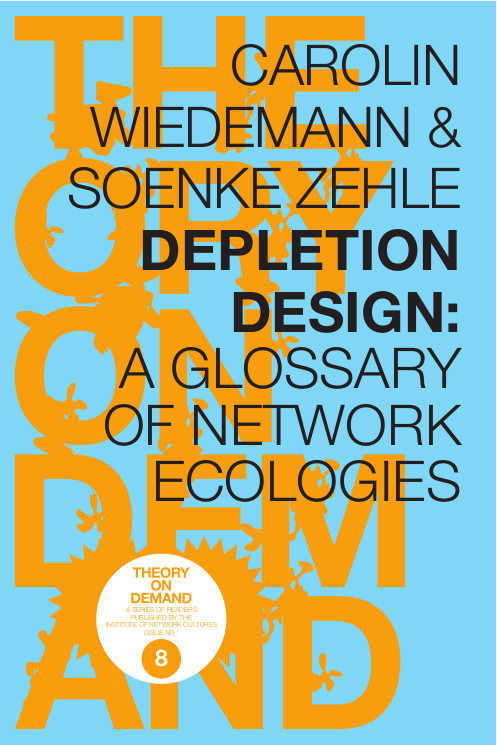Carolin Wiedemann, Soenke Zehle (eds.): Depletion Design: A Glossary of Network Ecologies (2012)
Filed under book | Tags: · algorithm, anonymous, architecture, biopolitics, commons, creative industries, cyborg, design, ecology, hackerspace, media ecology, network ecology, networks, politics, remix, software, spam, technology, theory

“Depletion Design suggests that ideas of exhaustion cut across cultural, environmentalist, and political idioms and offers ways to explore the emergence of new material assemblages. Soenke Zehle and Carolin Wiedemann discuss Depletion Design with Marie-Luise Angerer, Jennifer Gabrys and David M. Berry, inviting tm13 participants into a collaborative reflection on the necessity to understand human beings as one species among others – constituted by interactions of media, organisms, weather patterns, ecosystems, thought patterns, cities, discourses, fashions, populations, brains, markets, dance nights and bacterial exchanges (Angerer); on the material leftovers of electronics as provocations to think through and rework practices of material politics that may be less exploitative within our natural-cultural relationships (Gabrys); and on lines of flight from and through the computational – about expanding them into new ways of living beyond current limitations and towards new means of judgment and politics (Berry).
We, or so we are told, are running out of time, of time to develop alternatives to a new politics of emergency, as constant crisis has exhausted the means of a politics of representation too slow for the state of exception, too ignorant of the distribution of political agency, too focused on the governability of financial architectures. But new forms of individual and collective agency already emerge, as we learn to live, love, work within the horizon of depletion, to ask what it means to sustain ourselves, each other, again. Of these and other knowledges so created, there can no longer be an encyclopedia; a glossary, perhaps.”
Contributors: Marie-Luise Angerer (Cyborg), Franco ‘Bifo’ Berardi (Exhaustion, Soul Work), David M. Berry (On Terminality), Zach Blas (Queer Darkness), Drew S. Burk (Grey Ecology), Gabriella Coleman (Anonymous), Heidi Rae Cooley (Ecologies of Practice), Sebastian Deterding (Playful Technologies, Persuasive Design), Jennifer Gabrys (Natural History, Salvage), Johannes Grenzfurthner & Frank A. Schneider (Hackerspace), Eric Kluitenberg (Sustainable Immobility), Boyan Manchev (Disorganisation, Persistence), Lev Manovich (Software), Sonia Matos (Wicked Problems), Timothy Morton (Ecology without Nature), Jason W. Moore (Crisis), Anna Munster (Digital Embodiment), Eduardo Navas (Remix[ing] Re/Appropriations), Brett Neilson (Fracking), Sebastian Olma (Biopolitics, Creative Industries, Vitalism), Luciana Parisi (Algorithmic Architecture), Jussi Parikka (Dust Matter), Judith Revel (Common), Ned Rossiter (Dirt Research), Sean Smith (Information Bomb), Hito Steyerl (Spam of the Earth)
Publisher Institute of Network Cultures, Amsterdam, Dec 2012
Theory on Demand series, 8
Creative Commons Attribution-NonCommercial-ShareAlike 3.0 Netherlands License
ISBN 9789081857512
via jussiparikka.net
PDF, PDF (updated on 2015-7-9)
Comment (0)Google Search Quality Rating Guidelines (2007-2012)
Filed under handbook | Tags: · algorithm, google, labour, search, software, software studies, spam, web
Google’s manual for its unseen humans who rate the web. The raters are being hired through Google’s contractors such as Lionbridge, Leapforce and Appen Butler Hill.
Publisher Google, Inc.
43 pages; 125 pages; 161 pages
via Google Search
interview with a Google Search quality rater (searchengineland.com)
discussion (Slashdot)
commentary (v.3.27, searchengineland.com)
commentary (v.3.18, searchenginewatch.com)
commentary (v.2.1, searchengineland.com)
PDF (Version 3.27, June 2012)
PDF (Version 3.18, March 2011)
PDF (Version 2.1, April 2007)
Stephen Baker: The Numerati (2008)
Filed under book | Tags: · advertising, algorithm, blogging, computing, data, data mining, internet, mathematics, privacy, psychology, social media, surveillance, technology

An urgent look at how a global math elite is predicting and altering our behavior — at work, at the mall, and in bed.
Every day we produce loads of data about ourselves simply by living in the modern world: we click web pages, flip channels, drive through automatic toll booths, shop with credit cards, and make cell phone calls. Now, in one of the greatest undertakings of the twenty-first century, a savvy group of mathematicians and computer scientists is beginning to sift through this data to dissect us and map out our next steps. Their goal? To manipulate our behavior — what we buy, how we vote — without our even realizing it.
In this tour de force of original reporting and analysis, journalist Stephen Baker provides us with a fascinating guide to the world we’re all entering — and to the people controlling that world. The Numerati have infiltrated every realm of human affairs, profiling us as workers, shoppers, patients, voters, potential terrorists — and lovers. The implications are vast. Our privacy evaporates. Our bosses can monitor and measure our every move (then reward or punish us). Politicians can find the swing voters among us, by plunking us all into new political groupings with names like “Hearth Keepers” and “Crossing Guards.” It can sound scary. But the Numerati can also work on our behalf, diagnosing an illness before we’re aware of the symptoms, or even helping us find our soul mate. Surprising, enlightening, and deeply relevant, The Numerati shows how a powerful new endeavor — the mathematical modeling of humanity — will transform every aspect of our lives.
Publisher Mariner Books, Boston/New York, 2008
ISBN 0618784608, 9780618784608
256 pages
review (Marcus du Sautoy, The Guardian)
review (Rob Walker, The New York Times)
review (Tim Walker, The Independent)

